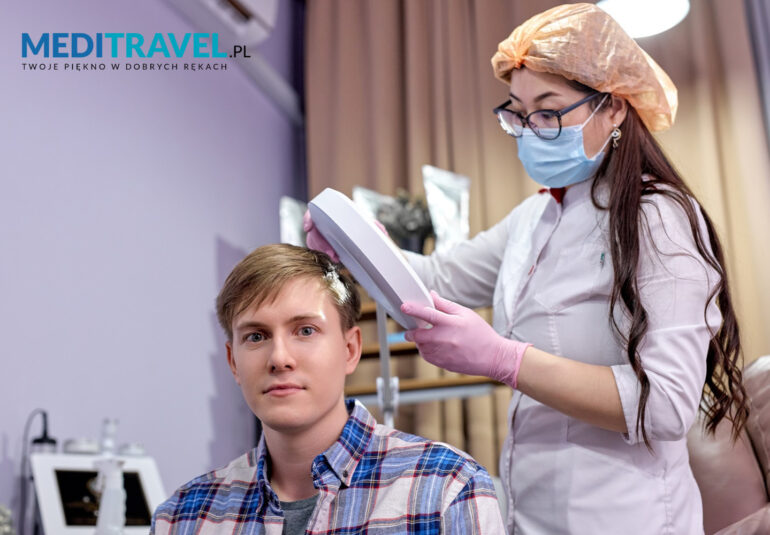
- Hair transplant
-
by Meditravel
What drugs causes hair loss?
For many people, taking medication is a necessity. They protect against the development of dangerous diseases and illnesses, and also relieve their symptoms. However, it is important to remember that regular use of pharmaceuticals has side effects. Sometimes these are serious and clearly noticeable. What they will be, is always indicated on the manufacturer’s leaflet, often the doctor informs about them when prescribing a given agent. One of the more common side effects is excessive hair loss. It may even lead to complete hair loss. This condition is called drug-induced alopecia. Which pharmaceuticals can cause this condition and how to fight it?
Causes of excessive hair loss
Hair loss is a natural process. A healthy person loses between 50 and 100 hairs every day. This loss is not a cause for concern. The problem arises when more hair is lost. In such cases we talk about excessive hair loss or even baldness. Usually genetic, environmental and hormonal factors are responsible for it. It may happen, however, that the baldness is caused by medications you are taking. Excessive hair loss is a side effect of their action. In such situations we talk about drug-induced alopecia.
Why does hair fall out after medication?
Drugs can cause sudden, gradual, diffuse or localized baldness It is also indicated that some pharmaceuticals destroy or disrupt the hair cycle in various ways, e.g. by accelerating its transition from the growth phase to the resting phase. As a result, telogenetic alopecia occurs. There are also medications that can disrupt the anagen phase, which is the stage of hair growth. As a result, you will notice abundant hair loss already a few days or weeks after starting the treatment.
How can you tell if drugs are causing excessive hair loss?
Many factors can have a negative impact on the condition of hair. It does not necessarily have to be due to regular use of pharmaceuticals. A suspicion of drug-induced hair loss is indicated when hair thins evenly over the entire head area rather than in patches. Another symptom of drug-induced hair loss is hair loss not only on the head, but also in other body areas, e.g. armpits, eyebrows, intimate areas. Characteristic for drug-induced hair loss is also the time of increased hair loss. Usually they start to fall out after approx. 3 months from the beginning of the therapy with a given drug.
Drugs that cause telogenetic alopecia
Drugs causing telogenetic alopecia cause premature induction of telogen and its extinction too quickly. Usually, this side effect occurs 2-4 months after the first use of the pharmaceutical, and also after about 3 places after the termination of its intake.
Telogenetic alopecia can be caused by:
- psychotropic drugs and mood stabilisers (sodium valproate and lithium),
- antidepressants – such as sertraline, fluoxetine,
- tricyclic antidepressants (TCAs),
- anticonvulsants,
- retinoids (vitamin A derivatives), which are used in the treatment of acne and psoriasis (they cause excessive hair loss in 20% – 30% of patients)
- isoniazid – used to treat tuberculosis
- indinavir, a treatment for HIV,
- anticoagulants, e.g. coumarin, heparin,
- antihypertensive drugs from the beta-blocker group,
- amiodarone, which is recommended in cardiac arrhythmias (however, this preparation causes drug-induced alopecia relatively rarely),
- Rheumatological drugs, e.g. – sulfasalazine, gold salts and methotrexate,
- non-steroidal anti-inflammatory drugs, e.g. ibuprofem (only with regular use),
- medicines used to lower blood lipids and cholesterol levels,
- antibiotics, and diseases accompanied by high fever.
Drugs that cause anagen hair loss
Drug-induced alopecia can take the form of anagen alopecia. It results from the disruption of the anagen phase by pharmaceuticals. Most commonly, anagenic alopecia occurs after administration of cytostatic drugs, i.e. those used in chemo- and radiotherapy. The purpose of these agents is to eliminate pathologically multiplying tumour cells in their primary focus, as well as in places of metastases. Thus, during the treatment there is a quick stoppage of mitotic activity in the whole organism, including hair follicles and hair bulbs. This means that cell division within the hair follicles is inhibited, as a result of which the hair temporarily keratinises and its follicles break. Hair falls out excessively during the phase of its active injury, and as a result of medication, the hair growth stage is stopped. How much and if any hair will fall out during chemotherapy and radiotherapy depends on the dose and timing of the anticancer drugs. The fact is, however, that drug-induced alopecia during cancer treatment affects approximately 65% of patients. It usually appears in them within a few days or weeks after administration of cystostatic drugs. At first, hair strands break and deform until they finally fall out completely. Hair loss does not only affect the scalp, but also eyebrows, eyelashes and other body parts. Hair does not start to grow back until several months after the treatment has been completed.
Does hormonal contraception cause baldness?
Although baldness is usually discussed in the context of men, women also struggle with this problem. In the case of drug-induced alopecia, the question arises whether ladies will lose their hair after discontinuing hormonal contraception. In such a situation, the problem of excessive hair loss may indeed arise, but it does not concern every woman. Predisposition to drug-induced hair loss connected with sex hormones used in contraception concerns only those ladies who are genetically burdened in this respect.
It is worth noting, however, that it may happen (although very rarely) that oral hormonal contraception irreversibly destroys hair roots and causes permanent baldness. However, complete baldness due to the hormonal pill is an extreme situation. It is much more common for women to notice an increased loss of hair strands 2-3 months after discontinuing contraceptives. The state of deterioration of the hair and hair loss can last up to six months. During this time, hair follicles regenerate and return to full functionality.
Anabolic steroids and alopecia areata
Drug-induced alopecia can also be heard in the context of anabolic steroids. It should be clearly emphasised here that the use of these substances causes a number of undesirable and negative effects on health. Steroids wreak real havoc on the body. It also translates into appearance. One of their side effects is excessive hair loss. This is because steroids damage – irreversibly – the hair follicles. This means that the hair will not only fall out, but will never grow back again.
How to treat drug-induced hair loss?
In most cases drug-induced alopecia is a reversible process. The excessive loss of hair strands will stop after a few weeks or months after the end of treatment. If you have been treated with pharmaceuticals for a long time, sometimes you need to be patient, because the body needs to adapt and the hair follicles need to regenerate. However, it is important to remember that it is not advisable to discontinue certain treatments. Some medications, although they cause hair loss, save lives and protect against much more serious diseases. It is therefore advisable to consult your doctor before you try to prevent drug-induced hair loss.
Aesthetic medicine also offers methods to treat drug-induced baldness. Cosmetic surgeries offer, among other things, laser therapy, stem cell treatment and mesotherapy. However, it is worth remembering that currently the most effective method of combating baldness is hair transplantation. Methods of this procedure you will learn on Meditravel website, and accurate information you will get by contacting our specialists.



